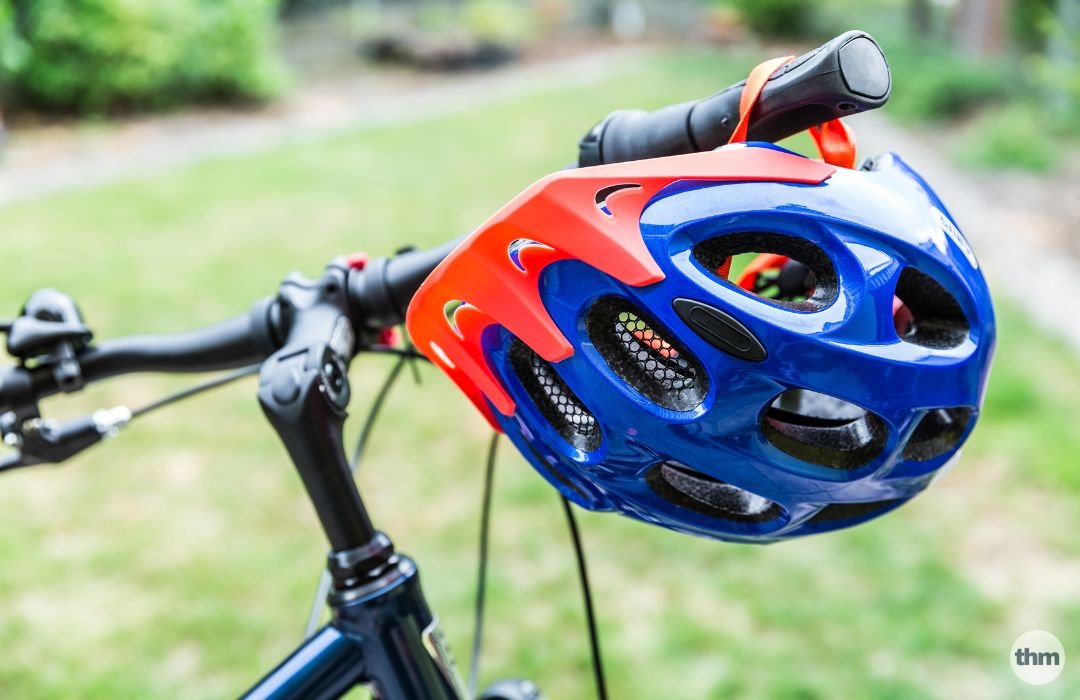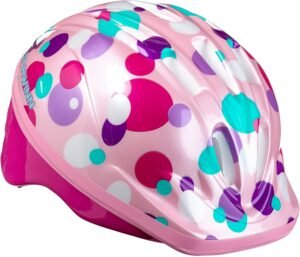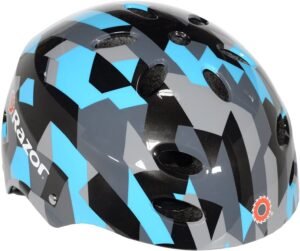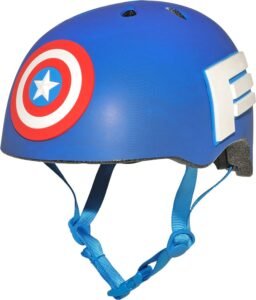
Best Kids Bike Helmets
This page contains affiliate links for which we may be compensated
Last updated: February, 2026
When it comes to ensuring the safety of your child while they enjoy outdoor activities like cycling, a reliable bike helmet is an absolute must-have. As a parent, finding the best kids bike helmet that combines comfort, style, and top-notch protection can be a challenging task. That’s why we’ve compiled a list of the top options available in the market, ensuring your child’s safety remains a top priority.
Safety First: Why a Quality Bike Helmet Matters
Before delving into the best kids bike helmets, it’s essential to understand why investing in a quality helmet matters. Bicycle accidents can happen unexpectedly, and a well-fitted helmet can significantly reduce the risk of head injuries. A proper bike helmet is designed to absorb impact, cushion the head, and minimize potential damage during falls or collisions. It’s a small investment that can have a massive impact on your child’s safety.
Factors to Consider When Choosing a Bike Helmet
When selecting a bike helmet for your child, several crucial factors should influence your decision:
- Safety Standards: Look for helmets that meet safety standards such as CPSC (Consumer Product Safety Commission) certification. This ensures that the helmet has passed rigorous tests and provides adequate protection.
- Size and Fit: A properly fitting helmet is essential for effective protection. Measure your child’s head circumference and choose a helmet size that offers a snug yet comfortable fit without being too tight.
- Adjustability: Opt for helmets with adjustable straps and sizing mechanisms. This ensures a secure fit and allows the helmet to grow with your child.
- Ventilation: Adequate ventilation prevents overheating during rides, making the helmet more comfortable to wear.
- Design and Style: Choose a helmet with designs or colors that your child will love. A helmet they’re excited to wear is more likely to stay on their head.
The Best Kids Bike Helmets: A Detailed Review

Schwinn Classic Design Kids Bike Helmet
Specifications
Recommended age:
0 – 3 years
Use:
Cycling
Size:
44 – 50cm
Do you need a helmet for your baby to use on the family bicycles? You’re in luck, I suppose. This traditional helmet was created by Schwinn for children from birth to age three. It comes in a variety of hues and designs, making safety enjoyable for your child.
The integrated visor in this helmet helps shield your child’s eyes from the sun. Schwinn’s 360-degree comfort, dial fit adjustability, and full-range padding are incorporated into the design to enhance your child’s comfort and fit.
To keep your child’s head cool on those sweltering summer days, the helmet has an ultra-lightweight vented design. It has a lower molded shell that increases the design’s durability and provides more protection for the back of the helmet.
According to Schwinn, this helmet fits everyone. However, some reviewers have complained that the straps and sizing can be loose, allowing the helmet to slide forward onto your child’s face.
Pros

Raskullz Mohawk Toddler Kids Bike Helmet
Specifications
Recommended age:
5+ years
Use:
Cycling
Size:
50 – 54cm
It can be extremely difficult to convince kids to always wear their helmets. The Raskullz Mohawk children’s bike helmet is useful in this situation. But the Raskullz Mohawk children’s bike helmet is more than just a fashionable item.
The Bell brand of helmets, considered to make some of the best for children, includes the Raskullz. The Mohawk, which is CPSC and ASTM-certified, has an inner shell made of EPS (Expanded Polystyrene) that absorbs shock. Soft cushion pads are also used to line the inner shell, adding another layer of comfort and security.
The Raskullz helmet has a cool 3D Fin Hawk on top with printed graphics of lightning bolts. Five battery-operated LED lights on the mohawk allow it to flash or shine brightly continuously. The helmet has an auto-shut-off feature to help preserve and extend battery life, so don’t worry about having to replace the batteries all the time.
The top of the helmet is lined with ventilation holes, and adjustable straps allow for a personalized fit. There are two sizes of the Mohawk helmet: one for children 3 to 5 years old, and the other for children 5 to 8 years old. The Raskullz Mohawk kids helmet is a multi-sport helmet that can be used for a variety of activities, including hoverboarding, skateboarding, scootering, rollerblading, and biking.
Pros

Razor V-17 Youth Multi-Sport Kids Bike Helmet
Specifications
Recommended age:
8 – 14 years
Use:
Multi-Use
Size:
54 – 58cm
The V-17 Youth Multi-Sport Helmet from Razor is a different child’s bike helmet that merits a five-star rating. It complies with CPSC requirements, offers excellent quality, and has a contemporary design.
The Razor V-17 has 17 vents across the top and sides of the helmet, as suggested by its name, which offers excellent ventilation and comfort on those hot summer days. The padding inside the helmet is ergonomic, ensuring a secure fit. Additionally, Razor has provided extra pads that you can use to adjust the fit for even more comfort and security.
The chin strap can be adjusted and offers a snug fit. Additionally, Razor has chosen a side-releasing buckle. A useful feature that makes putting on, taking off, and adjusting the helmet a breeze.
Boys and girls both benefit greatly from the Razor V-17 Youth. Kids aged 8 to 14 can purchase it in a selection of six different colors. There is a Razor V-17 Child version available for children ages 5-8.
Pros

Bell Marvel Kids Bike Helmet
Specifications
Recommended age:
3 – 5 years
Use:
Cycling
Size:
48 – 52cm
This child’s bike helmet is certified to the U.S. CPSC Safety Standard and is made by the reputable helmet manufacturer Bell Helmet. Additionally, it complies with American ASTM safety regulations for multi-impact helmets.
It is especially appealing to young Marvel fans because of the Captain America print. With sizes to fit children from 3 years old to 14 years old, it is offered in nine different Marvel designs. If you’re thinking about buying this helmet, keep in mind that a few customers have commented that it is a very small product. Think about sizing down.
The helmet has an EPS shell that absorbs shock, and the chin straps can be easily adjusted for a snug, comfortable fit. The top of the helmet is lined with cooling vents for added comfort and ventilation.
Pros

Schwinn Paw Patrol Toddler and Kids Bike Helmet
Specifications
Recommended age:
3 – 8 years
Use:
Cycling
Size:
48 – 54cm
Another top-notch children’s bike helmet from Schwinn, this one featuring PAW Patrol graphics that will appeal to children.The helmet has Schwinn’s 360° Comfort, which includes a dial that can be adjusted at the back and full-range padding for a snug, personalized fit. The top of the helmet is lined with ten ventilation holes, which is ideal for hot summer days.
Two size ranges are offered for the helmet: 3-5 years and 5-8 years. More protection and increased durability are provided by the shell’s extended lower section. This feature is helpful because children in this age range may be the most prone to falling. There are prints in both sizes that are appropriate for boys and girls.
Pros
How to Properly Fit a Bike Helmet
Ensuring a proper fit is paramount when it comes to the effectiveness of a bike helmet in safeguarding your child’s head during cycling activities. A helmet that is too loose or improperly positioned can significantly diminish its protective capabilities. Follow these step-by-step instructions to ensure your child’s bike helmet fits them snugly and securely:
1. Measure Head Circumference:
Before purchasing a bike helmet, measure your child’s head circumference using a soft measuring tape. Measure around the widest part of their head, just above their eyebrows. This measurement will help you select the appropriate helmet size.
2. Check the Helmet Size:
Choose a helmet size that corresponds to your child’s head circumference. The helmet’s packaging or product description will provide a size range that the helmet can accommodate.
3. Position the Helmet:
Place the helmet on your child’s head so that it sits level and squarely. The helmet should cover the forehead, sitting about one or two finger-widths above the eyebrows.
4. Adjust the Side Straps:
Adjust the side straps to form a “V” shape just below your child’s ears. The straps should sit comfortably against the skin without causing any irritation.
5. Fasten the Chin Strap:
Buckle the chin strap securely under your child’s chin. The strap should be snug but not too tight, allowing them to open their mouth comfortably.
6. Fine-Tune the Fit:
Many helmets come with an adjustable fit system, typically in the form of a dial or a strap at the back of the helmet. Use this feature to fine-tune the fit. Turn the dial or adjust the strap until the helmet fits securely on your child’s head without any wobbling or discomfort.
7. Check for Stability:
Gently shake your child’s head from side to side and front to back while wearing the helmet. The helmet should remain stable and not shift around excessively. If it does, adjust the straps and fit the system accordingly.
8. Perform a Final Check:
Ensure that the helmet does not obstruct your child’s vision and that it doesn’t tilt forward or backward. The fit should be snug but not constricting, allowing for comfort and proper airflow.
9. Test a Few Movements:
Have your child move their head in various directions, mimicking the movements they might make while cycling. This helps ensure that the helmet remains securely in place no matter how they twist or turn.
Remember, children’s heads can grow, so it’s essential to regularly check the fit of the helmet. As your child grows, you may need to adjust the helmet’s fit system to accommodate their changing head size. Ensuring a well-fitted helmet enhances your child’s safety and encourages them to develop lifelong habits of wearing protective gear during outdoor activities.
Safety Tips
While a properly fitted bike helmet forms a critical part of your child’s safety gear, there are several additional safety measures you should implement to ensure their well-being while cycling. Educating your child about safe biking practices and setting rules for their outdoor adventures can significantly reduce the risk of accidents. Here are some essential safety tips to keep in mind:
Learn and Follow Traffic Rules
Teach your child about basic traffic rules and signals, even if they are cycling in a park or residential area. Understanding the importance of stopping at stop signs, yielding to pedestrians, and using hand signals helps instill responsible biking habits from a young age.
Choose Safe Routes
Identify safe routes for your child to ride their bike. Whenever possible, opt for pathways or streets with designated bike lanes or minimal traffic. Avoid busy roads with fast-moving vehicles.
Be Visible
Equip your child’s bike with reflective stickers or accessories, especially if they are riding in low-light conditions or during dusk. Bright clothing and properly functioning bike lights can also significantly enhance visibility to motorists and pedestrians.
Always Wear a Helmet
Emphasize the importance of wearing a bike helmet every time your child rides, regardless of the distance or familiarity of the route. Make helmet-wearing a non-negotiable rule.
Ride in Single File
Teach your child to ride in a single-file line, particularly when cycling with friends. This prevents crowding and ensures they have ample space on the road.
Stay Alert
Encourage your child to stay focused and alert while biking. Distractions, such as using a phone or wearing headphones, can impede their ability to react to potential hazards.
Use Hand Signals
Teach your child the importance of using hand signals to indicate turns or stops. This practice helps alert motorists and fellow cyclists to their intentions.
Check the Bike Regularly
Regularly inspect your child’s bike to ensure it’s in good working condition. Check the brakes, tires, and other components to prevent unexpected malfunctions.
Stay Hydrated
Remind your child to stay hydrated, especially during hot weather. Encourage them to carry a water bottle while riding.
Be Cautious at Intersections
Instruct your child to approach intersections with caution, even if they have the right of way. Teach them to make eye contact with drivers before crossing.
No Riding at Night
Forbid nighttime cycling unless your child is equipped with proper lighting and reflective gear. Nighttime visibility is significantly reduced, increasing the risk of accidents.
Set a Good Example
Children often mimic their parent’s behavior. Demonstrate responsible cycling practices by wearing your own helmet and adhering to traffic rules when you ride with them.
By incorporating these safety tips into your child’s biking routine, you can help create a culture of responsible cycling habits. Teaching them to prioritize safety from an early age ensures they can enjoy outdoor activities while minimizing the potential risks associated with cycling.
Frequently Asked Questions (FAQs)
Conclusion
When it comes to your child’s safety, there’s no room for compromise. Investing in a high-quality bike helmet is a crucial step in protecting your child during their cycling adventures. With a plethora of options available, consider factors such as safety standards, fit, and design to find the perfect helmet that offers both security and style. By following proper fitting and maintenance guidelines, you can ensure your child’s bike helmet remains a reliable companion for countless rides to come.
